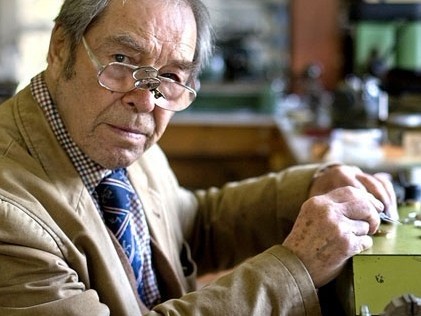(单词翻译:单击)
George Daniels
手握乾坤:制表大师乔治·丹尼尔斯
George Daniels, master watchmaker, died on October 21st, aged 85
近250年来最伟大的制表师乔治·丹尼尔斯(George Daniels)于10月21日去世,享年85岁。
A SCHOOLBOY once asked George Daniels what he had at the end of the chain that led to his pocket. A silly question, really. But it was worth asking, because what Mr Daniels pulled out, carefully, was what he called his Space Traveller's Watch. It gave mean solar time, mean sidereal time, equation of time, and could chart the phases of the moon. Mr Daniels liked to say it would be useful for trips to Mars. He had surmised almost the same when, at five or six, he had first prised open with a fairly blunt breadknife the back of an old watch he had found at home, and seen “the centre of the universe” inside.
一名男学生曾经问乔治·丹尼尔斯,他那根伸进衣袋的链子末端有什么。多么愚蠢的问题。但是值得一答。因为丹尼尔斯小心翼翼从口袋里拿出来的表被他称为“宇宙旅行者之表”。表盘上不仅能显示平太阳时,还能显示平恒星时、时差,记录月相。丹尼尔斯说,去火星旅行的时候这款表就能大显身手。其实在五六岁的时候他就想到这一点了。那是他第一次用钝了的面包刀剖开家里的一块旧表,看见了“宇宙的核心”。

He had never imagined then that he would make the universe by hand. But he did. Every component of his Space Traveller's Watch—as of the 36 other watches he made, each unique, over his 42 working years—was produced from scratch. He made the screws, the springs and the levers, the pallets and gears, the hands and the plain, often numberless dials. He also made the tools that made them, except for the lathes and turning engines. No one else had ever learned the dozens of necessary skills. But after years of teaching himself horology from clocks bought for a bob or two at jumble sales, or comrades' broken watches in the army, or the wonderful Breguet and old English timepieces he went on to restore for collectors, he had begun to think, why not?
那时候丹尼尔斯还从未想象过自己能够将整个宇宙纳入一块表中。但是他确实做到了。在42年的制表生涯中,他一共制作了37块表,每一块都独一无二。其中之一便是“宇宙旅行者之表”。表的每一部分都是由他亲手制作,没有使用任何外来的零件——螺钉、弹簧、杠杆、托盘和齿轮、指针以及简洁但是有无数刻度的钟面。连用来制作这些零件的工具都是他自己做的——用来发动引擎的车床除外。在丹尼尔斯之前,没有人学过如许多基本的制表技术。他自学钟表制作多年,这些钟表有的是花一两个先令从旧货摊上买来的,有的是军队军官用坏了的,还有的是他为收藏者修复的精致无比的宝玑(Breguet)表和古老的英国座钟。多年后,他自问:为什么我不能自己制表呢?
Hour after hour, for it wasn't the sort of work you could just do a little of and leave again, he would cut and shape, file and polish, temper and hammer. The work flowed from the tools almost unconsciously. He learned from a craftsman in Clerkenwell how to make cases, usually of gold with a silver back and bezels. His first watch was sold to a collector friend, Sam Clutton, in 1970 for £1,900; when sold in 2002, it fetched more than £200,000.
他就这样开始了制表生涯。他会连续几个小时地工作,切割塑造出基本形状,用矬子将表打磨光滑,用小锤调整精确度。这些工作不允许匠人只敲打一会儿就去做的别的事情。匠人几乎是无意识地被工具操控着。丹尼尔斯向一名匠人学习怎样制作表盒,通常是那种银质的背部和带有银质表座的金质表盒。他的第一块表于1970年以1900英镑的价格卖给了一个名叫Sam Clutton的收藏家朋友。而这块表在2002年卖出的时候,售价超过了20万英镑。
Tick, tock
滴答,滴答
A hard, poor childhood in north London had given him a nose for a deal and a sharp sense of the value of everything. But his pieces were private experiments, not commissions. He wanted to build watches that kept better time than any in the 500 years before. The general public was happy, from the late 1960s, with quartz models that lost, on average, two or three seconds a month. But Mr Daniels was determined to show that a mechanical watch could beat them. In the mid-1970s he made a double-escapement watch for Mr Clutton which, over 32 days, lost less than a second. His happiness at beating quartz came close to his boyhood joy when a wall-clock he had mended magnificently exploded, springs and glass everywhere, as the family ate their bread and jam at the supper table.
丹尼尔斯在伦敦北部度过了他贫穷艰苦的童年,这一段生活经历培养了他善于发现商机的天才和对一切事物价值的敏锐直觉。但是他制作的钟表都是个人的试验品,而非受委托制作的商品。他还想制作出五百年来报时最准确的表。从20世纪60年代以来,人们就使用石英表,并对其每个月平均误差两到三秒的性能十分满意。但是他下定决心要制作出前无古人的机械表。20世纪70年代中期,他为Sam Clutton制作了一块双擒纵机构的表。32天里表的误差没有超过一秒。这次他的表打败了石英表所带来的喜悦不亚于孩提时代他修过的家里的壁钟突然爆炸,弹簧和玻璃蹦得到处都是带给孩子的惊喜,而那时全家人正围着餐桌吃果酱面包呢。
Now he had to improve on the lever escapement, which had been invented in 1754 by the English horologist Thomas Mudge and used in most watches since. It worked by friction, as the teeth of the gears slid over the pallet; but this arrangement needed lubrication, and as the oil degraded the watch lost time. Mr Daniels became obsessed with the tick, tock of clocks (a sound that filled his various homes, together with silvery chimes), and how to get an impulse on both the tick and the tock that would not be affected by humidity, temperature, oil sludge or agitation. His solution, invented in 1976, was the co-axial escapement, an arrangement in which two wheels, placed one above the other, transmitted to the pallet a radial impulse that needed no lubrication and so (if wound) would never stop.
接着他要完善的是叉瓦式擒纵机构。叉瓦式擒纵机构1754年由英国制表师Thomas Mudge发明,从那以后就广泛运用于大部分表中。它的表面指针由齿轮在托盘上滑动产生的摩擦带动。但是这一工作原理要求内部零件保持润滑,否则随着润滑度的磨损,报时会逐渐丧失准确性。随着研究的深入,丹尼尔斯越来越对钟表发出的滴答声着迷,这声音和银铃般的报时钟声,在他的每一处宅邸里荡漾。他还痴迷于解决如何使表获得传动又不受湿度、温度、润滑度和震动影响的问题。该问题的解决方案于1976年诞生,这便是同轴式擒纵机构。这一装置由叠置于托盘上的两个齿轮组成,两个齿轮会向托盘传递放射状的传动力而不需要任何的润滑,因此永远不会停止(如果“永远”可以实现的话)。
That achievement earned him many honours for services to horology, but it was only the beginning of a long slog to get his idea accepted. The world of clocks and watches was a closed one. He knew it himself, because his boyhood watch studies from library books were a private realm only he could understand, and the 18th-century English masters—Mudge, Arnold, Earnshaw—the only real friends he had. Watchmakers kept the secrets they learned in their lonely working hours. Even later, when he had put himself in the millionaires' bracket and had to move to the Isle of Man for tax reasons, his friends were in the motoring clubs where he shared his other passion, for vintage Bentleys and racing cars. He had no watchmaker friends at all.
这一成就作为他对钟表业的杰出贡献,为他赢得了诸多荣誉。但这只是他为普及自己的技术使用而踏上的荆棘之路的起点。钟表业界是一个封闭的世界。他通过自己的经历得出这一点,因为他童年时从图书馆的书籍上获得的钟表知识构成了一个只有他自己才能涉足的私人领域,而18世纪英国的制表大师Mudge, Arnold和Earnshaw是他仅有的真正的朋友。制表师们都各自保留着他们在孤独工作时知悉的钟表的秘密。即使后来,丹尼尔斯进入百万富翁的行列,为了避重税不得不搬到马恩岛(Isle of Man),他的朋友也仅限于摩托俱乐部内,这里有他能找到对老式宾利车和赛车的共同爱好者。他的朋友里没有一个是制表师。
So it was no surprise to him, though keenly disappointing, that the Swiss watchmaking industry was neither eager to look at the co-axial escapement, nor able to understand it. He did the rounds of the factories for more than 20 years. After four years with Patek Philippe, he could not persuade them to make it. Omega began to produce it in limited editions in 2006, after seven years of “development” that Mr Daniels dismissed as unnecessary. Large-scale production would have been too expensive. But Mr Daniels also suspected sheer dislike of outsiders.
所以,瑞士的钟表制作业对他的同轴式擒纵机构既不感兴趣也不能理解,这也是他意料之中的事,尽管他还是为此十分失望。他花了二十多年时间寻找钟表制造商来采用他的技术,为了说服百达翡丽(Patek Philippe)他就花了整整四年,但是仍然失败了。欧米茄在对同轴式擒纵技术进行七年的“发展”后开始利用该技术生产限量版手表,而这七年在丹尼尔斯眼里毫无必要。欧米茄称“限量”是因为大规模生产成本过高,但是丹尼尔斯怀疑他们仅仅是不欢迎圈外人。
While restoring the timepieces made by his idol Breguet in the 19th century, he had made two clocks in the same style, just to prove he could beat the master. They were so fine that the company insisted on putting the Breguet secret signatures on them. Mr Daniels went along with it. He had a secret cipher of his own, though, a dove with an olive branch. It meant peace to his rivals, French or Swiss; but if the most ingenious invention in watchmaking for 250 years was too tricky for them, why, he would just pick it up, snap it shut and put it back in his pocket.
在修复他的偶像Breguet制作于19世纪的座钟的同时,他还制作了两台同样风格的座钟,仅仅为了证明他可以战胜这位制表大师。这两台座钟高贵典雅精美绝伦,宝玑表公司(Breguet)甚至坚持要将Breguet的秘密签名刻在上面。丹尼尔斯同意了。他自己也有一个秘密签名,是一只衔着橄榄枝的鸽子,意味着与竞争对手法国和瑞士之间的和睦相处。但是如果250年来钟表制造业中最具天才的发明对于这两个国家太过神秘晦涩,那么,丹尼尔斯何不收起他的表,“啪”地一声合上表盖,放回衣袋呢。


